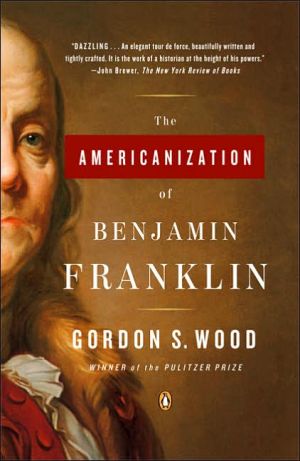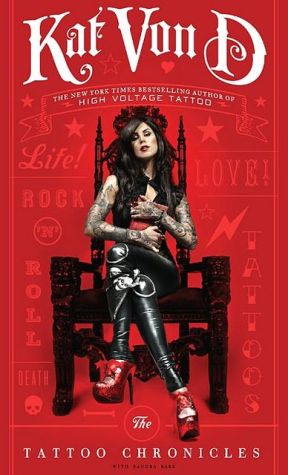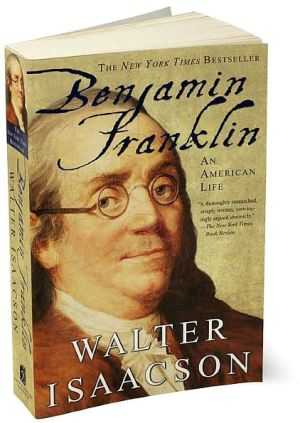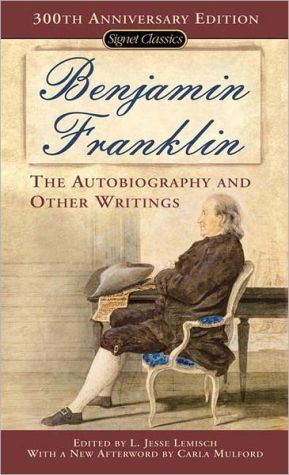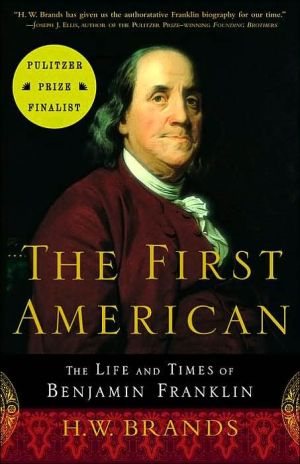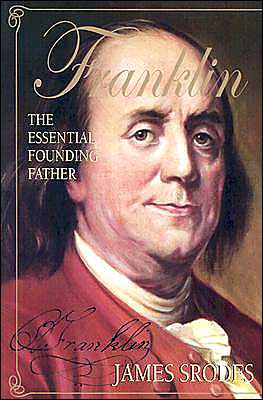The Americanization of Benjamin Franklin
From the most respected chronicler of the early days of the Republic—and winner of both the Pulitzer and Bancroft prizes—comes a landmark work that rescues Benjamin Franklin from a mythology that has blinded generations of Americans to the man he really was and makes sense of aspects of his life and career that would have otherwise remained mysterious. In place of the genial polymath, self-improver, and quintessential American, Gordon S. Wood reveals a figure much more ambiguous and...
Search in google:
From the most respected chronicler of the early days of the Republic—and winner of both the Pulitzer and Bancroft prizes—comes a landmark work that rescues Benjamin Franklin from a mythology that has blinded generations of Americans to the man he really was and makes sense of aspects of his life and career that would have otherwise remained mysterious. In place of the genial polymath, self-improver, and quintessential American, Gordon S. Wood reveals a figure much more ambiguous and complex—and much more interesting. Charting the passage of Franklin’s life and reputation from relative popular indifference (his death, while the occasion for mass mourning in France, was widely ignored in America) to posthumous glory, The Americanization of Benjamin Franklin sheds invaluable light on the emergence of our country’s idea of itself.Caspar Weinberger - ForbesThis has been an especially good reading summer for devotees of American Colonial and Revolutionary his-tory. First and, in my opinion, the best of the many new books covering this period is Washington's Crossing--by David Hackett Fischer (Oxford University Press, $35). Professor Fischer is a noted historian, whose Albion's Seed, published in 1989, tells the story of those descendants of the British who settled here and helped create the United States. His Paul Revere's Ride has also been widely and justly praised. Washington's Crossing tells the complete story of General George Washington's most daring, risky and successful venture early in the war. Following a succession of victories by the British and their mercenary forces, which had resultedin the loss of New York for the Americans, the British were within sight of Philadelphia, where the new American Congress was sitting. Washington's army had been all but destroyed, and the British were surging across New Jersey. Washington's decision to cross the Delaware River on Christmas night 1776, when it was considered virtually impossible, was a move both bold and foolhardy. A flotilla of small boats crammed with soldiers, guns and horses somehow rowed across the river through one of the East's worst winter snow and ice storms. (The crossing as painted by Emanuel Leutze in 1851 captured this event spiritually and has become a great icon of the Revolution.) By crossing the Delaware, Washington placed the remnants of his army in a position to trap the British behind Trenton and, a few days later, to give that army and the cause for which it fought its first real victory. In many ways the shots fired atTrenton were the shots "heard round the world." Professor Fischer conveys in a remarkably realistic way what combat and the fog of war are actually like. But, more important, he tells the story of what it was like for Washington to lead a discouraged, underequipped army that was constantly being micromanaged by a divided Congress that couldn't--at least at the beginning--decide whether it wanted independence or, simply, to get the Stamp Act repealed. For those who still wonder how the Revolutionaries ever defeated the huge British forces arrayed against them, both on land and at sea, this book makes clear that it was the military genius and leadership of George Washing-ton that turned almost certain defeat into victory. Washington's Crossing is an essential and exciting key to a more complete understanding and appreciation of what our ancestors did to win the Revolution. A new biography, Alexander Hamilton by Ron Chernow (Penguin Press, $35), is another superb book I read this summer. Hamilton served as principal aide to General Washington from the early days of the Revolu-tion. This gave him a ringside seat at the formation of the United States and its implausible victory over the British, who had deployed one of the world's finest military machines but lost to a ragtag army of upstarts. Chernow's splendid, thorough and brilliantly written biography gives us a new understanding of Hamilton's vi-tal role during the war and immediately after as Secretary of the Treasury of this new entity on the world's stage. I doubt that many people realize how much of our country's financial structure we owe to Alexander Hamilton. This book goes beyond the standard fare offered in most American history classes. Hamilton's towering intellect, as well as his many faults, and his long, fierce disagreements with Thomas Jefferson, John Adams and many of the other Founding Fathers are presented here with almost shocking candor. There have been other biographies of Hamilton, but Chernow's is far and away the most comprehensive and compelling of any I have read. It is a fitting tribute to the man who set the U.S. on the path that has made our nation the economic leader of the world. Another treat for Revolutionary history enthusiasts is The Americanization of Benjamin Franklin by Gordon S. Wood (Penguin Press, $25.95). This delightful new study focuses on the actual aristocratic and elitist views and opinions of this so-called populist leader, who was one of our best-loved, most influential and renowned spokesmen to the world. Moving away from Revolutionary times, I next read, and thoroughly enjoyed, Miles Gone By: A Literary Autobiography byWilliam F. Buckley Jr. (Regnery Publishing, $29.95). Buckley, a major founder of today's sen-sible conservatism, has led an extraordinary life, which fully matches his extraordinary talents. His subtitle is apt, as the book contains essays on sailing, skiing, music, old friends and colleagues and all manner of other diverse subjects, which are united in that they have all been of interest to one of the best minds and writers in America today.
BOSTON BEGINNINGS\ Franklin was born in Boston on January 17, 1706 January 6, 1705, in the old-style calendar), of very humble origins, origins that always struck Franklin himself as unusually poor. Franklin’s father, Josiah, was a non conformist from Northamptonshire who as a young man had immigrated to the New World and had become a candle and soap maker, one of the lowliest of the artisan crafts. Josiah fathered a total of seventeen children, ten, including Benjamin, by his second wife, Abiah Folger, from Nantucket. Franklin was number fifteen of these seventeen and the youngest son.\ In a hierarchical age that favored the firstborn son, Franklin was, as he ruefully recounted in his Autobiography, “the youngest Son of the youngest Son for Generations back.”’ In the last year of his life the bitterness was still there, undisguised by Franklin’s usual irony. In a codicil to his will written in 1789 he observed that most people, having received an estate from their ancestors, felt obliged to pass on something to their posterity. “This obligation,” he wrote with some emotion, “does not lie on me, who never inherited a shilling from any ancestor or relation.”\ Because the young Franklin was unusually precocious (“I do not remember when I could not read,” he recalled), his father initially sent the eight-year-old boy to grammar school in preparation for the ministry. But his father soon had second thoughts about the expenses involved in a college education, and after a year he pulled the boy out of grammar school and sent him for another year to an ordinary school that simply taught reading, writing, and arithmetic. These two years of formal education were all that Franklin was ever to receive. Not that this was unusual: most boys had little more than this, and almost all girls had no formal schooling at all. Although most of the Revolutionary leaders were college graduates—usually being the first in their families to attend college—some, including Washington, Robert Morris, Patrick Henry, Nathanael Greene, and Thomas Paine, had not much more formal schooling than Franklin. Apprenticeship in a trade or skill was still the principal means by which most young men prepared for the world.\ Franklin’s father chose that route of apprenticeship for his son and began training Franklin to be a candle and soap maker. But since cutting wicks and smelling tallow made Franklin very unhappy, his father finally agreed that the printing trade might better suit the boy’s “Bookish Inclination.” Printing, after all, was the most cerebral of the crafts, requiring the ability to read, spell, and write. Nevertheless, it still involved heavy manual labor and was a grubby, messy, and physically demanding job, without much prestige.\ In fact, printing had little more respectability than soap and candle making. It was in such “wretched Disrepute” that, as one eighteenth-century New York printer remarked, no family “of Substance would ever put their Sons to such an Art,” and, as a consequence, masters were “obliged to take of the lowest People” for apprentices. But Franklin fit the trade. Not only was young Franklin bookish, but he was also nearly six feet tall and strong with broad shoulders—ideally suited for the difficult tasks of printing. His father thus placed him under the care of an older son, James, who in 1717 had returned from England to set himself up as a printer in Boston. When James saw what his erudite youngest brother could do with words and type, he signed up the twelve-year-old boy to an unusually long apprenticeship of nine years.\ That boy, as Franklin later recalled in his Autobiography, was “extremely ambitious” to become a “tolerable English Writer.” Although literacy was relatively high in New England at this time—perhaps 75 percent of males in Boston could read and write and the percentage was rapidly growing— books were scarce and valuable, and few people read books the way Franklin did.’ He read everything he could get his hands on, including John Bunyan’s Pilgrim’s Progress, Plutarch’s Lives, Daniel Defoe’s Essay on Projects, the “do good” essays of the prominent Boston Puritan divine Cotton Mather, and more books of “polemic Divinity” than Franklin wanted to remember. He even befriended the apprentices of booksellers in order to gain access to more books. One of these apprentices allowed him secretly to borrow his master’s books to read after work. “Often,” Franklin recalled, “I sat up in my Room reading the greatest Part of the Night, when the Book was borrow’d in the Evening & to be return’d early in the Morning lest it should be miss’d or wanted.” He tried his hand at writing poetry and other things but was discouraged with the poor quality of his attempts. He discovered a volume of Joseph Addison and Richard Steele’s Spectator papers and saw in it a tool for self-improvement. He read the papers over and over again and copied and recopied them and tried to recapitulate them from memory. He turned them into poetry and then back again into prose. He took notes on the Spectator essays, jumbled the notes, and then attempted to reconstruct the essays in order to understand the way Addison and Steele had organized them. All this painstaking effort was designed to improve and polish his writing and it succeeded; “prose Writing” became, as Franklin recalled in his Autobiography, “of great Use to me in the Course of my Life, and was a principal Means of my Advancement.” In fact, writing competently was such a rare skill that any one who could do it well immediately acquired importance. All the Founders, including Washington, first gained their reputations by some thing they wrote.\ In 1721 Franklin’s brother, after being the printer for another person’s newspaper, decided to establish his own paper, the New England Courant. It was only the fourth newspaper in Boston; the first, published in 1690, had been closed down by the Massachusetts government after only one issue. The second, the Boston News-Letter; was founded in t it became the first continuously published newspaper not only in Boston but in all of the North American colonies. The next Boston paper, begun in 1719 and printed by James Franklin for the owner, was the Boston Gazette.” These early newspapers were small, simple, and bland affairs, two to four pages published weekly and containing mostly reprints of old European news, ship sailings, and various advertisements, together with notices of deaths, political appointments, court actions, fires, piracies, and such matters. Although the papers were expensive and numbered only in the hundreds of copies, they often passed from hand to hand and could reach beneath the topmost ranks of the city’s population of twelve thousand, including even into the ranks of artisans and other “middling sorts.”\ These early papers were labeled “published by authority.” Remaining on the good side of government was not only wise politically, it was wise economically. Most colonial printers in the eighteenth century could not have survived without government printing contracts of one sort or another. Hence most sought to avoid controversy and to remain neutral in politics. They tried to exclude from their papers anything that smacked of libel or personal abuse. Such material was risky. Much safer were the columns of dull but innocuous foreign news that they used to fill their papers, much to Franklin’s later annoyance. It is hard to know what colonial readers made of the first news item printed in the newly created South Carolina Gazette of 1732: “We learn from Caminica, that the Cossacks continue to make inroads onto polish Ukrania”\ James Franklin did not behave as most colonial printers did. When he decided to start his own paper, he was definitely not publishing it by authority In fact, the New England Courant began by attacking the Boston establishment, in particular the program of inoculating people for smallpox that was being promoted by the Puritan ministers Cotton Mather and his father. When this inoculation debate died down, the paper turned to satirizing other subjects of Boston interest, including pretended learning and religious hypocrisy, some of which provoked the Mathers into replies. Eager to try his own hand at satire, young Benjamin in 1722 submitted some essays to his brother’s newspaper under the name of Silence Dogood, a play on Cotton Mather’s Essays to Do Good, the name usually given to the minister’s Bonifaicius, published in 1710. For a sixteen-year-old boy to assume the persona of a middle-aged woman was a daunting challenge, and young Franklin took “exquisite Pleasure” in fooling his brother and others into thinking that only “Men of some Character among us for Learning and Ingenuity” could have written the newspaper pieces.\ These Silence Dogood essays lampooned everything from funeral eulogies to “that famous Seminary of Learning,” Harvard College. Al though Franklin’s satire was generally and shrewdly genial, there was often a bite to it and a good deal of social resentment behind it, especially when it came to his making fun of Harvard. Most of the students who attended “this famous Place,” he wrote, “were little better than Dunces and Blockheads.” This was not surprising, since the main qualification for entry, he said, was having money. Once admitted, the students “learn little more than how to carry themselves handsomely, and enter a Room genteely, (which might as well be acquire’d at a Dancing-School,) and from whence they return, after Abundance of Trouble and Charge, as great Blockheads as ever, only more proud and self-conceited.” One can already sense an underlying anger in this precocious and rebellious teenager, an anger with those who claimed an undeserved social superiority that would become an important spur to his ambition.\ When Franklin’s brother found out who the author of the Silence Dogood pieces was, he was not happy, “as he thought, probably with reason,” that all the praise the essays were receiving tended to make the young teenager “too vain.” Franklin, as he admitted, was probably “too saucy and provoking” to his brother, and the two brothers began squabbling. James was only nine years older than his youngest brother, but he nonetheless “considered himself as my Master & me as his Apprentice.” Consequently, as master he “expected the same Services from me as he would from another; while I thought he demean’d me too much in some he requir’d of me, who from a Brother expected more Indulgence.”\ Since the fraternal relationship did not fit the extreme hierarchical relationship of master and apprentice, the situation became impossible, especially when James began exercising his master’s prerogative of beating his apprentice.\ Indentured apprentices were under severe contractual obligations in the eighteenth century and were part of the large unfree population that existed in all the colonies. In essence they belonged to their masters: their contracts were inheritable, and they could not marry, play cards or gamble, attend taverns, or leave their masters’ premises day or night without permission. With such restraints it is understandable that Franklin was “continually wishing for some Opportunity” to shorten or break his apprenticeship.\ In 1723 that opportunity came when the Massachusetts government—like all governments in that pre-modern age, acutely sensitive to libels and any suggestion of disrespect—finally found sufficient grounds to forbid James to publish his paper. James sought to evade the restriction by publishing the paper under Benjamin’s name. But it would not do to have a mere apprentice as editor of the paper, and James had to return the old indenture of apprenticeship to his brother. Although James drew up a new and secret contract for the remainder of the term of apprenticeship, Franklin realized his brother would not dare to reveal what he had done, and he thus took “Advantage” of the situation “to assert my Freedom.”\ His situation with his brother had become intolerable, and his own standing in the Puritan-dominated community of Boston was little better. Since Franklin had become “a little obnoxious to the governing Party” and “my indiscreet Disputations about Religion began to make me pointed at with Horror by good People, as an Infidel or Atheist,” he determined to leave Boston. But because he still had some years left of his apprenticeship and his father opposed his leaving, he had to leave secretly. With a bit of money and a few belongings, the headstrong and defiant seventeen-year-old boarded a ship and fled the city, a move that was much more common in the mobile eighteenth-century Atlantic world than we might imagine. Thus Franklin began the career that would lead him “from the Poverty & Obscurity in which I was born & bred, to a State of Affluence & some Degree of Reputation in the World.”\ PHILADELPHIA\ Franklin arrived in the Quaker city renowned for its religious freedom in 1723, hungry; tired, dirty; and bedraggled in his “Working Dress,” his “Pockets stuffed out with Shirts and Stockings,” with only a Dutch dollar and copper shilling to his name. He bought three rolls, and “with a Roll under each Arm, and eating the other,” he wandered around Market, Chestnut, and Walnut Streets, and in his own eyes, and the eyes of his future wife, Deborah Read, who watched him from her doorway, made “a most awkward ridiculous Appearance.” He finally stumbled into a Quaker meetinghouse on Second Street, and “hearing nothing said,” promptly “fell fast asleep, and continu’d so till the Meeting broke up, when one was kind enough to wake me.”\ Franklin tells us in his Autobiography that he offers us such a “particular”—and unforgettable—description of his “first Entry” into the city of Philadelphia so “that you may in your Mind compare such unlikely Beginnings with the Figure I have since made there.” Although he tried in his Autobiography to play down and mock his achievements, Franklin was nothing if not proud of his extraordinary rise. He always knew that it was the enormous gap between his very obscure beginnings and his later worldwide eminence that gave his story its heroic appeal.\ Philadelphia in the 1720s numbered about six thousand people, but it was growing rapidly and would soon surpass the much older city of Boston. The city, and the colony of Pennsylvania, had begun in the late seventeenth century as William Penn’s “Holy Experiment” for poor persecuted members of the Society of Friends. But by the time Franklin arrived, many of the Quaker families, such as the Norrises, Shippens, Dickinsons, and Pembertons, had prospered, and this emerging Quaker aristocracy had come to dominate the mercantile affairs and politics of the colony. At the same time, however many non-English immigrants— Germans at first and later Scotch-Irish—had begun to pour into the colony in increasing numbers. Most of these new immigrants came as servants; indeed, at least half the population of Philadelphia during the early and middle decades of the eighteenth century was composed of indentured servants.\ Since the Philadelphia that Franklin moved to was still a very small town, knit together by face-to-face relationships, Franklin was able to become acquainted with people fairly quickly. He first looked for work with the dominant printer of the colony, Andrew Bradford, who was the government printer and since 1719 had been publishing Pennsylvania’s only newspaper, the American Weekly Mercury. When Franklin discovered that Bradford had no place for him, he ended up working in the shop of a rival printer, Samuel Keimer. He eventually found lodging in the home of a plain carpenter, John Read, the father of the woman who had watched his awkward and ridiculous entry into the city.\ He soon made friends in the town with clerks and other middling sorts who had intellectual and literary ambitions similar to his. He was unusually amiable, told a good story and worked at getting along with people. He tells us that very early on he developed “the Habit of expressing my self in Terms of modest Diffidence, never using when I advance any thing that may possibly be disputed, the Words, Certainly, undoubtedly, or any others that give the Air of Positiveness to an Opinion.” Looking back, he realized that this habit had been “of great Advantage” to him in persuading people to come round to his point of view.”\ With his amiability and talent he soon became an artisan to be reckoned with. He knew more about printing than his employer, Samuel Keimer; indeed, as Governor William Keith of Pennsylvania quickly surmised, this talented teenager knew more about printing than anyone in Philadelphia. He was extremely bright and naturally affable, and his future as an artisan looked very promising.
Preface ix Acknowledgements xi List of Illustrations xv\ Introduction 1\ \ Becoming a Gentleman 17\ Becoming a British Imperialist 61\ Becoming a Patriot 105\ Becoming a Diplomat 153\ Becoming an American 201\ \ Notes 247\ Index 287
\ From Barnes & NoblePulitzer Prizewinning historian Gordon S. Wood thinks that we have Benjamin Franklin all wrong. The author of The Radicalism of the American Revolution insists that by presenting Franklin as the proverbial "first American," we misrepresent him. It would be more accurate, he writes, to call him "the last American." In this strikingly original biography, Wood shows that "Poor Richard" was a devoted and well-rewarded subject of the British Empire. As an affluent aristocrat, he risked both wealth and international prestige by supporting the Revolution, simultaneously arousing the suspicions of firebrand revolutionaries like John and Samuel Adams. A breakthrough biography.\ \ \ \ \ ForbesThis has been an especially good reading summer for devotees of American Colonial and Revolutionary his-tory. First and, in my opinion, the best of the many new books covering this period is Washington's Crossing--by David Hackett Fischer (Oxford University Press, $35). Professor Fischer is a noted historian, whose Albion's Seed, published in 1989, tells the story of those descendants of the British who settled here and helped create the United States. His Paul Revere's Ride has also been widely and justly praised.\ Washington's Crossing tells the complete story of General George Washington's most daring, risky and successful venture early in the war. Following a succession of victories by the British and their mercenary forces, which had resultedin the loss of New York for the Americans, the British were within sight of Philadelphia, where the new American Congress was sitting.\ Washington's army had been all but destroyed, and the British were surging across New Jersey. Washington's decision to cross the Delaware River on Christmas night 1776, when it was considered virtually impossible, was a move both bold and foolhardy. A flotilla of small boats crammed with soldiers, guns and horses somehow rowed across the river through one of the East's worst winter snow and ice storms. (The crossing as painted by Emanuel Leutze in 1851 captured this event spiritually and has become a great icon of the Revolution.) By crossing the Delaware, Washington placed the remnants of his army in a position to trap the British behind Trenton and, a few days later, to give that army and the cause for which it fought its first real victory. In many ways the shots fired atTrenton were the shots "heard round the world."\ Professor Fischer conveys in a remarkably realistic way what combat and the fog of war are actually like. But, more important, he tells the story of what it was like for Washington to lead a discouraged, underequipped army that was constantly being micromanaged by a divided Congress that couldn't--at least at the beginning--decide whether it wanted independence or, simply, to get the Stamp Act repealed.\ For those who still wonder how the Revolutionaries ever defeated the huge British forces arrayed against them, both on land and at sea, this book makes clear that it was the military genius and leadership of George Washing-ton that turned almost certain defeat into victory. Washington's Crossing is an essential and exciting key to a more complete understanding and appreciation of what our ancestors did to win the Revolution.\ A new biography, Alexander Hamilton by Ron Chernow (Penguin Press, $35), is another superb book I read this summer. Hamilton served as principal aide to General Washington from the early days of the Revolu-tion. This gave him a ringside seat at the formation of the United States and its implausible victory over the British, who had deployed one of the world's finest military machines but lost to a ragtag army of upstarts.\ Chernow's splendid, thorough and brilliantly written biography gives us a new understanding of Hamilton's vi-tal role during the war and immediately after as Secretary of the Treasury of this new entity on the world's stage. I doubt that many people realize how much of our country's financial structure we owe to Alexander Hamilton. This book goes beyond the standard fare offered in most American history classes. Hamilton's towering intellect, as well as his many faults, and his long, fierce disagreements with Thomas Jefferson, John Adams and many of the other Founding Fathers are presented here with almost shocking candor.\ There have been other biographies of Hamilton, but Chernow's is far and away the most comprehensive and compelling of any I have read. It is a fitting tribute to the man who set the U.S. on the path that has made our nation the economic leader of the world.\ Another treat for Revolutionary history enthusiasts is The Americanization of Benjamin Franklin by Gordon S. Wood (Penguin Press, $25.95). This delightful new study focuses on the actual aristocratic and elitist views and opinions of this so-called populist leader, who was one of our best-loved, most influential and renowned spokesmen to the world.\ Moving away from Revolutionary times, I next read, and thoroughly enjoyed, Miles Gone By: A Literary Autobiography byWilliam F. Buckley Jr. (Regnery Publishing, $29.95). Buckley, a major founder of today's sen-sible conservatism, has led an extraordinary life, which fully matches his extraordinary talents. His subtitle is apt, as the book contains essays on sailing, skiing, music, old friends and colleagues and all manner of other diverse subjects, which are united in that they have all been of interest to one of the best minds and writers in America today.\ —Caspar Weinberger\ \ \ \ Publishers WeeklyEminent revolutionary historian Wood illuminates the life and times of perhaps our nation's most symbolic yet enigmatic forefather. Born of modest roots, Benjamin Franklin displayed from an early age a sharp mind and a literary gift, which served him as he went on to amass a small fortune, mostly as a printer, and to emerge as a civic leader. Wood, who won a Pulitzer Prize in 1993 for The Radicalism of the American Revolution, shows how Franklin's skills and charm enabled him to complete the remarkable transition from humble beginnings to gentlemanly status, occupying his later years with scientific experiments, philosophy and statesmanship. Wood also introduces us to Franklin the loyal British subject, who could scarcely conceive of a colonial government independent of the British, yet, in 1776, at the age of 70, came to play a key role in the Revolution. He secured the help of the French, who in turn helped ultimately to define Franklin as the "symbolic American." This is not a comprehensive biography. Instead, Wood's purpose is to supplant our common knowledge of Franklin as the iconic, folksy author of Poor Richard's Almanac with a different, richer portrait, a look at how a man "not even destined to be an American" became, paradoxically, the "symbol of America." What emerges is a fascinating portrait of Franklin, not only as a forefather but as a man. Illus. Agent, Andrew Wylie. (May 24) Forecast: Has readers' curiosity about Franklin been sated by Edmund Morgan's recent brief study and Walter Isaacson's full-length bio, both bestsellers? Wood's reputation could still give this legs. Copyright 2004 Reed Business Information.\ \ \ \ \ KLIATTPrize-winning author Gordon Wood (The Radicalism of the American Revolution; The Creation of the American Republic, 1776—1787) gives us a fresh view of one of America's founding fathers, whose tercentennial will be celebrated in 2006. The author intends to "recover the historic Franklin" and to "place Franklin's incredible life in its eighteenth-century context." A wealthy self-made man, Franklin retired from active business in 1748 at the age of 42. He then threw himself into scientific experiments, politics and public service. "By the early 1760s Franklin had become a thoroughgoing imperialist and royalist." He was sent to England as an emissary to get Pennsylvania made a royal protectorate. Charles II had granted William Penn a proprietary charter and the Penn family ran the state like a fiefdom. Franklin fell in love with London and hated the thought of returning to America. He stayed five years, trying to get the Stamp Act repealed and explaining the attitudes of Americans to the English, though he English found him too American and the Americans found him too English. Eventually, war broke out and Franklin was sent to France, where he spent eight years as a diplomat, trying to win support for the rebellious Americans. He was happy there, lionized as a scientist, writer, diplomat, philosopher, and wit. He finally returned to Philadelphia in 1785, unsure of his welcome. Only a few weeks after his arrival, he became the head of the Commonwealth of Pennsylvania. Franklin's attitude toward his family, slavery, capitalism, and democracy are also explored in this estimable volume. It is entertaining, readable, carefully researched, and perceptive. KLIATT Codes:SA—Recommended for senior high school students, advanced students, and adults. 2004, Penguin, 299p. illus. notes. index., Ages 15 to adult. \ —Janet Julian\ \ \ \ \ Library JournalBenjamin Franklin is considered one of America's greatest men and is arguably the most important Founding Father after Washington. However, what most Americans don't realize is that for much of his life Franklin was a fervent loyalist and British imperialist who, even as late as 1775, felt that the differences between Britain and the Colonies could be settled in "half an hour." Wood (history, Brown Univ.) examines Franklin's evolution from Crown official (he served as postmaster general for the Colonies) to one of America's most outspoken revolutionaries. Franklin spent so much time in England (at one point living in London for ten years) that he was often out of touch with American opinion; he supported both the Stamp Act and the Townshend Duties, for instance. In fact, upon his return to America in 1775, many thought he was a spy for the British. Also examined are Franklin's controversial views on democracy, which made him a hero in France but placed him at odds with the new American government, and how he eventually came to epitomize the myth of the self-made American. Well written and researched, this book provides a fresh perspective on one of America's most distinguished figures. Recommended for most libraries. Robert Flatley, Kutztown Univ. Lib., PA Copyright 2004 Reed Business Information.\ \ \ \ \ Kirkus ReviewsA reluctant revolutionary? A French wannabe? A portrait of Ben Franklin in a decidedly contrarian-though careful-bit of revisionism. "Although he may have eventually become the supreme symbol of America," writes Wood (History/Brown Univ.; The Radicalism of the American Revolution, 1992, etc.), "he was certainly not the most American of the Founders during his lifetime. Indeed, one might more easily describe him as the least American and the most European of the nation's early leaders." This was not only because most of Franklin's commercial and intellectual ties were with London, but also because he inclined, early on, to a somewhat aristocratic view of human affairs, sniffing at those who had to make a mere living and enjoying gentlemanly pursuits. So upper-crust English was he by temperament that Franklin relocated to England in the late 1750s and proceeded to write his American friends letters about the blessings of London for anyone with a brain: the city enjoyed "in every Neighbourhood, more sensible, virtuous and elegant Minds, than we can collect in ranging 100 Leagues of our vast Forests." Franklin offered to pay the losses caused by the Boston Tea Party out of his own pocket, and he pressed for an English-American Act of Union that would forever bond the two. Yet something happened in England-something about which Wood offers intriguing guesses-so that Franklin returned to America convinced of the justice of the revolutionary cause: "What impressed most delegates" to the Continental Congress, Wood writes, "was the intensity of Franklin's commitment to the patriot cause. He seemed deeply angry at the Crown and British officialdom and was impatient with all efforts atreconciliation." He committed himself to that revolution even as other Founders suspected him of being a fair-weather friend, at considerable personal danger. Even so, he moved to Paris almost as soon as the war was over, and "the nearly eight years that Franklin spent in France were the happiest of his life," far away from the postcolonial crowd. An illuminating companion to Walter Isaacson's Benjamin Franklin (2003) and other recent studies that cast the Founder in a new light. Agent: Andrew Wylie\ \
